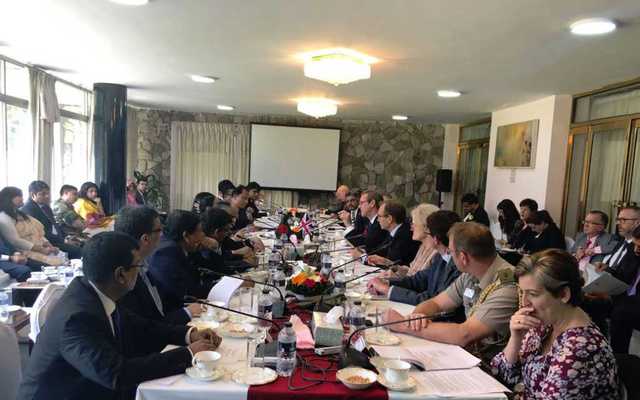Bangladesh-UK strategic dialogue discusses terrorism

Image collected
Bangladesh and Britain have discussed the recent terrorist attacks in New Zealand and Sri Lanka, and agreed to work together to counter terrorism and violent extremism.
In the third strategic dialogue led by the UK’s top diplomat, which Britain holds only with Canada and Israel, officials stood in a minute's silence to pay respect to the victims of both countries in those attacks, said a diplomat who was part of the delegation.
Later at a press release, the foreign ministry said as fellow Commonwealth members, the UK and Bangladesh stood in solidarity with and condemned the recent terrorist attacks in New Zealand and Sri Lanka that claimed scores of innocent lives.
Permanent Under Secretary of the Foreign and Commonwealth Office of the UK Sir Simon McDonald led the UK side while his counterpart Foreign Secretary Md Shahidul Haque headed the Bangladesh team at the dialogue held at the state guesthouse Padma.
Having lifted their bilateral relations to a strategic level, they agreed to continue to cooperate on security, countering terrorism and violent extremism to safeguard their citizens and global humanity from this menace, according to the press release.
The joint press release, however, did not say whether they have discussed the extradition of convicted criminals of Bangladesh who are living in the UK.
A diplomat who has knowledge of the issue told bdnews24.com that the press release was the “agreed public text”.
“We raised the issue of mutual legal assistance and extradition. We’ll continue to raise it,” a senior official at the Bangladesh foreign service told bdnews24.com.
Opposition BNP’s acting chief Tarique Rahman is living in London with his lifetime imprisonment sentence pending in Dhaka. War criminal Chowdhury Mueen Uddin who is sentenced to death for his crimes against humanity in 1971 is also hiding in London.
McDonald, however, faced questions on issues related to extradition, and sheltering convicted criminals in the UK later at the Bangladesh Institute of International and Strategic Studies (BIISS) while speaking on Brexit.
He did not give a direct answer to those questions. But at one stage, without mentioning any name, he said: “This is an issue. It’s a sensitive issue.”
He said there are many cases between the countries and over 90 percent of those cases are happily resolved. “This is because of the good and smooth work between the agencies and high commissions of Bangladesh and the UK.”
The foreign ministry said the dialogue demonstrated the “full depth” of the Bangladesh-UK relationship and involved exchange of views on political relations, celebration of the 50th anniversary of the establishment of diplomatic relations, trade and investment, education and skills, good governance and human rights.
They also discussed the future development partnership, migration and security and defence cooperation, and regional and global issues of mutual interest.
The issue of finding a durable solution to the Rohingya crisis figured “high” in the discussions.
Earlier, on Tuesday he said the challenge of displaced people of the Rakhine state is “very much in the UK’s mind and it is more in the Bangladesh’s mind because Bangladesh is now hosting more than 1 million Rohingya people”.
He had said the UK, as one of the permanent members of the UNSC, is the penholder on the Rohingya issue in New York and will not let it drop.
He said the strategic dialogue which began two years back was the signal that “this is an important relationship that covers policy waterfront”.
VISA ISSUE, CURRY INDUSTRY
Both sides touched on the 17 different areas of cooperation between the countries.
Bangladesh stressed the importance of an efficient decision-making process for UK visa applications for its nationals, particularly for students and businesses.
The UK restated its commitment to maintain a high quality service for Bangladeshi nationals at the visa application centres in Dhaka and Sylhet.
McDonald highlighted that the number of visa applicants from Bangladesh is increasing year-on-year with an average approval rate of around 70 percent in 2018 – up nearly 10 percent from 61 percent in 2016.
The UK welcomed Bangladesh’s continued commitment to take back its citizens who no longer have the right to remain in the UK, and welcomed progress in this regard.
Both sides also discussed the issue of the proposed cross-border Higher Education Rules, which if implemented, will allow UK universities to operate in Bangladesh. Bangladesh proposed to open a dialogue in this regard.
Both countries also agreed to consider further ways in which Bangladeshi students could be encouraged to study in the UK.
Bangladesh reiterated its request for additional annual Commonwealth, Chevening and other scholarships for its students.
The UK noted the increase in Chevening allocation and agreed to consider further requests.
Both countries highlighted the valuable contribution that the Bangladeshi-British diaspora continue to make to British society and agreed that they should continue with efforts to create greater connectivity between the two nations.
Bangladesh highlighted concerns of the British curry industry, on the shortage of skilled workers and the proposed wage structure as part of the future immigration white paper, whilst recognising their significant contribution to the British economy.
The Bangladesh side also informed the UK it will host a ‘Bangladesh Trade and Investment Expo’ in London in October / November 2019, and the UK welcomed efforts in this regard to promote commercial links and investment flows.
Both countries agreed to consider encouraging coordination between major chambers of commerce.
Both sides agreed to host events in Bangladesh and the UK in 2021 to mark the 50th anniversary of the establishment of diplomatic relations between the UK and Bangladesh.
Source: https://bdnews24.com